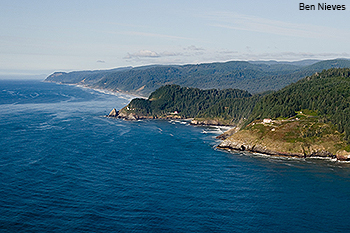Oregon Land Conservation and Development Commission Approves Territorial Sea Plan
 The Land Conservation and Development Commission today approved a Territorial Sea Plan that designates and maps the important ecologic, economic and cultural areas along Oregon's coast. This action sets a precedent for how Oregon will conserve and manage these areas to sustain the diverse benefits they provide the state. The plan, which combines recommendations from the Ocean Policy Advisory Council and the Territorial Sea Plan Advisory Committee, passed by a vote of 6-1 and identifies 4 areas off the Oregon coast as suitable for future marine renewable energy development.
The Land Conservation and Development Commission today approved a Territorial Sea Plan that designates and maps the important ecologic, economic and cultural areas along Oregon's coast. This action sets a precedent for how Oregon will conserve and manage these areas to sustain the diverse benefits they provide the state. The plan, which combines recommendations from the Ocean Policy Advisory Council and the Territorial Sea Plan Advisory Committee, passed by a vote of 6-1 and identifies 4 areas off the Oregon coast as suitable for future marine renewable energy development.
“The Territorial Sea Plan uses solid data to protect ocean health while responsibly planning for renewable energy siting,” said Susan Allen of the Pew Environment Group. Allen serves as director of Our Ocean, a coalition representing more than 250,000 Oregonians from a diverse group of organizations including the Oregon AFL-CIO, Oceana and the Audubon Society of Portland.
“Oregon took an important step today by charting a path to a cleaner future,” she added.
The plan includes 144 scenic viewsheds, like Cape Perpetua and the Samuel Boardman State Park.
Oregon took an important step today by charting a path to a cleaner future.- Susan Allen, director, Our Ocean
“A critical first step in this process was to identify and map all of the important ecological areas off the Oregon coast," said Ben Enticknap, Pacific Project Manager with Oceana. "Now the state is moving forward with a plan that designates and protects these important areas from future development."
In response to the 2007 passage of Oregon's Renewable Energy Portfolio Standard, Governor Ted Kulongoski directed the Department of Land Conservation and Development to update the Territorial Sea Plan, the state's ocean management manual. He directed that it include a responsible strategy for renewable energy siting, such as wave and tidal energy facilities, in state ocean waters.
The Ocean Policy Advisory Council and the Territorial Sea Plan Advisory Committee were then convened. The two advisory groups collaborated on developing a plan that carefully balances the need to protect existing benefits and uses -- including conservation, recreation and fishing -- while responsibly planning for new ones. The final plan, approved by the Land Conservation and Development Commission, will now be submitted to the federal government for enforcement.
Our Ocean is a coalition of conservationists, scientists, ocean users, local leaders and business people from around the state working to preserve Oregon's coastal legacy.






